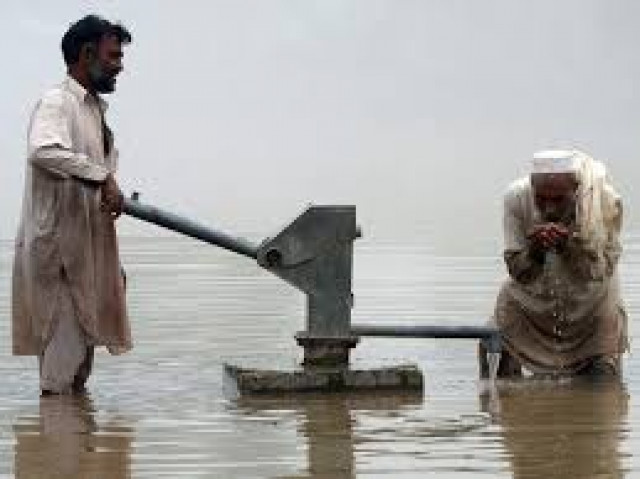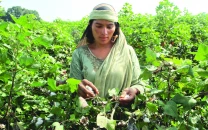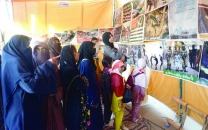What Pakistan’s worsening water crisis needs — another conference
Natural river flow is a better alternative to building dams, says expert

The nation is on the cusp of water emergency. PHOTO: EXPRESS
Students set out to help water-starved residents
"Tarbela and Mangla dams contribute around 10% of the total water required for irrigation of agricultural lands in the country. The remaining 90% still comes from flow of the river," said Dr Hassan Abbass, an expert of hydrology, who dwelt at length in his presentation making an argument against construction of dams.
"The world now acknowledges that a flowing river is a healthy river and the stored water is unhealthy." He underlined the need of adopting the 'flowing river model' and desisting from the dam-centered approach of water management.
For him, dams are costly and besides creating inter-provincial controversies over water sharing, they also end up denying release of the required quantity of water to the sea which leads to sea intrusion. "It's a misconception that the delta [the place where river meets the sea] belongs to Sindh province only. It [the delta] belongs to the river and to the whole country," he clarified.
According to the estimates he shared from the 1980s to the present times, the sea has been affecting 24 million acres of land and consuming eight acres every day. In the last century, up to 200 million acre per feet water went to the sea from the River Indus which has currently shrunk to the paltry one or two MAF. This is despite the 1991 Water Accord which provides for releasing 10 MAF in the sea.
He said the coastal land in Badin, Thatta and Sujawal districts where sea intrusion is being neglectfully allowed is a pricey land in terms of agriculture and other purposes.
Dr Abbass suggested utilisation waterfront land along the river for commercial and residential purposes and inland navigation through the river to generate economic activity. He said that the stretch of the rivers in Pakistan spread to around 7,000 kilometers. "To begin with, the government can build a pot at Kotri Barrage [in Jamshoro near Hyderabad]. And later, the people living near the barrages in Sukkur, Guddu, Multan and Attock may demand construction of ports there as well."
All the provinces of Pakistan, he said, can earn significantly from the inland navigation which is the cheapest mode of transport. According to him, India is already planning an inland navigation project but as compared to Pakistan, the former country is at a disadvantage because its delta is mostly located in Bangladesh.
He traced navigation in River Indus as far back as 326 BC by Alexandar of Macedonia. It was also done in different times in the 17th, 18th and 19th centuries. "The port at Kotri can be built and made operational much before the Gawadar port. It requires some investment and release of water in the river," he shared.
According to him, at the Karachi port, only around half of some 30 berths are presently being used because inland road communication does not allow loading and offloading of containers in all the berths. He said the Kotri port can immediately help reduce burden from Karachi while helping the country increase its exports and imports.
The water expert also shared models of efficient use of water to irrigate agricultural land which will end the need of constructing dams and provide more water for the river. "In a meeting with the Chinese policy makers, they said they wouldn't have built the Three Gorges dam if the solar technology was harnessed in the 1990 when the dam project began. They are generating 8,000 megawatts from the dam while the solar power is providing 70,000 MW energy to the country," the expert said.
SHC serves notices on petition against unclean water supply, water theft
Zahid Hussain Bhurgari, a representative of the Sindh Chamber of Agriculture, which is a farmers' lobbying group, differed with Dr Abbass on the matter of dam building. He said they support construction of the Diamer Bhasha dam. "Sindh's agriculture is currently dependent on Tarbela dam. When Tarbela empties we don't get water for our crops," he contended.
He said both China and India have constructed tens of thousands of dams but when Pakistan decides to build the dams, voices of opposition crop up without cogent justification.
Advocate Ali Palh of Rights Now, a non-profit, who also belongs to the Pakistan Tehreek-e-Insaf, contended that the dams do not affect environment or the biodiversity. He said the dams which have been approved by the Council of Common Interests (CCI) should be constructed.
Sindh Abadgar Board General Secretary Dr Zulfiqar Yousfani supported Dr Abbass's propositions about putting a stop on dam construction and releasing more water in the river while adopting efficient farming. "Bhasha dam can be filled once in four to five years only. But Dr Abbass's concept about allowing natural flows in the river, commercial and residential use of waterfront land and inland navigation can revolutionise the water management and the economy."
Advocate Israr Chang, an office bearer of the Sindh High Court Bar Association, objected to the television campaign being run in favour of the dams. He argued that the campaign does not inform the people about flip sides of the dams.
Published in The Express Tribune, September 30th, 2018.



















COMMENTS
Comments are moderated and generally will be posted if they are on-topic and not abusive.
For more information, please see our Comments FAQ